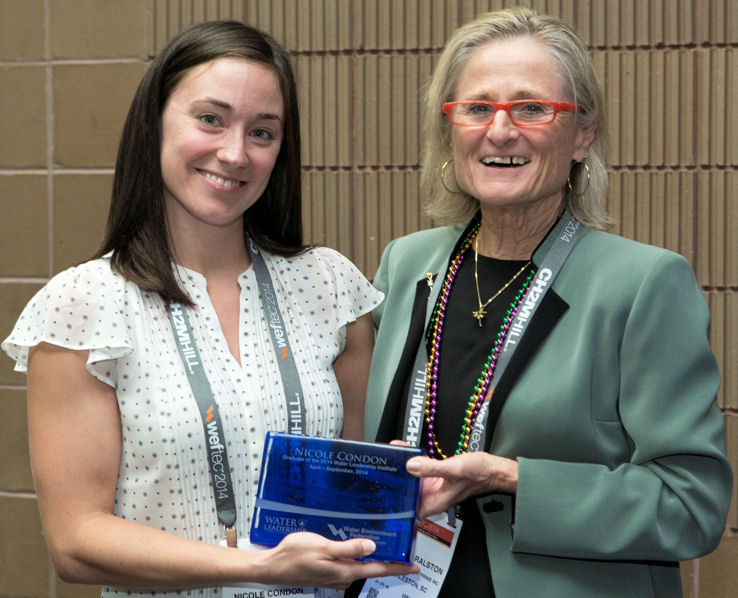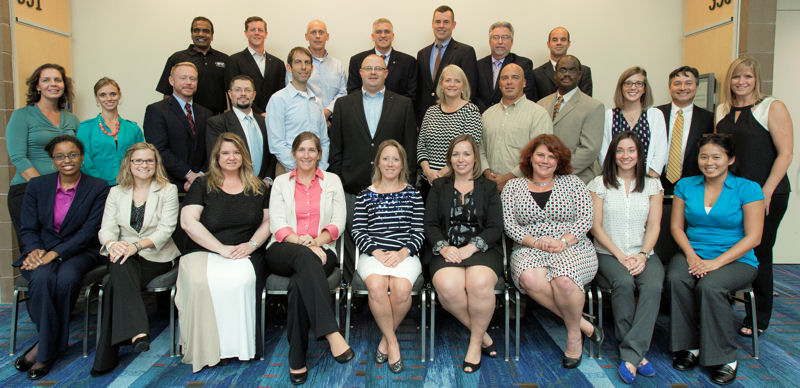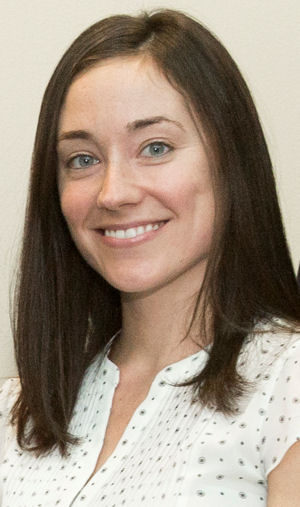| Nicole Condon, 2014 graduate of WEF’s Water Leadership Institute
Nicole Condon is the Water Communications coordinator in DC Water’s (Washington, D.C.) Office of External Affairs. In addition to managing drinking water marketing and communications for the authority, Condon serves as chairwoman for the Metropolitan Washington Council of Governments (Washington, D.C.) Community Engagement Campaign. For the campaign, she coordinates with member utilities to address regional communication issues. She received her master’s degree in Environmental Science from American University (Washington, D.C.) in 2011 and a bachelor’s degree in Environmental Studies from Eckerd College (St. Petersburg, Fla.) in 2007. |
I must confess that I hadn’t heard of the Water Environment Federation (WEF; Alexandria, Va.) Water Leadership Institute (WLI) until a colleague shared the program’s description with me shortly before the 2014 application period closed. The description resonated with me, and I was immediately fascinated by this unique, professional-development opportunity. Although the institute is relatively new, a growing number of alumni testimonials portrayed the program as a valuable educational experience, differentiated by a diverse cohort and strategies that are immediately applicable in the workplace. As a WLI graduate I can confirm these characterizations and offer my perspective, which adds to the program’s endorsements.
The 2014 WLI programming focused on personal strengths that drive professional success. The concept of leveraging individual strengths for workplace productivity may seem intuitive, but I quickly learned that a strengths-focused leadership approach requires practice and active engagement. One of the key messages from Tom Rath and Barry Conchie’s book, Strengths Based Leadership – Great Leaders, Teams, and Why People Follow, was that the world’s best leaders are not well-rounded and skilled in all desirable attributes. Both the book and many of our discussions highlighted examples of historically successful enterprises led by diverse teams, which were carefully assembled by leaders who recognize the importance of complementing each person’s strengths and weaknesses.
In addition to an informative 2-day workshop at WEF headquarters, we contributed to group discussions and webcasts designed to help us engage with each other and learn leadership strategies from seasoned leaders. One of the most interesting features of the program is that participants represent different parts of North America and numerous focus areas within the drinking water, stormwater, and wastewater sectors. This provides exceptional networking opportunities and allows participants to consider a broad spectrum of issues they might not otherwise confront in their own areas of expertise.

From left, Nicole Condon receives her Water Leadership Institute graduation plaque during WEFTEC 2014 from Sandra Ralston, 2013–2014 Water Environment Federation (Alexandria, Va.) president. Photo courtesy of Oscar Einzig Photography.
In small groups, we identified and addressed a water-sector challenge through an innovative solution. Each team started from a conceptual phase and worked through completion of a report and final presentation. The group-project experience gave us the chance to identify team strengths and observe group dynamics through the lens of a strengths-based problem solving approach.
My group did not have balanced representation in each of the leadership strength areas. As a team characterized heavily by relationship building strength, we overcame the inherent challenges and ultimately found ways to use our strengths composition as an advantage. We also learned that being aware of the strengths missing from a group can help the team identify ways to compensate or avoid potential pitfalls.

The 2014 Water Leadership Institute graduates and mentors include, front row from left, Erinna Kinney, Christel Dyer, Elizabeth Turner, Amber Baylor, Jennifer McDonnell, Erin Longworth, Kerstin Kenty, Nicole Condon, and Tina Pham; middle row from left, Renee Kayal, Suzanne Mechler, Tye Jordan, Brian Boyer, Ely Greenberg, James Cooper, Christine Putnam, Bryan Berdeen, David Hunter, Kelsey Hurst, Christopher Stacklin, and Susan Strong; back row from left, Prasad Chittaluru, Guy Voss, Jeffrey King, Scott Conklin, John Friel, James Langley, and Justin Waples. Photo courtesy of Oscar Einzig Photography.
Since the WLI graduation at WEFTEC, my project team has continued to communicate regularly about topics of mutual interest. I have built strong professional connections with my fellow WLI graduates.
The friends I made through the experience were an unexpected and priceless benefit of the program. This underscored another topic the WLI class of 2014 explored: work-life balance. Through the WEFCOM discussion board, participants shared strategies for maintaining a healthy work-life balance and learned about the success of individuals who prioritize personal commitments. The WLI program puts an interactive and innovative spin on traditional leadership curriculum, and I would highly recommend it to anyone seeking a creative training opportunity.
— Nicole Condon, 2014 graduate of WEF’s Water Leadership Institute
|
Apply Now To Participate in the 2015 Water Leadership Institute The Water Environment Federation (WEF; Alexandria, Va.) Water Leadership Institute now is accepting applications for the 2015 program. The program is designed to encourage innovation, entrepreneurship, and professional commitment from future leaders of the water quality sector. Developed and operated by WEF, it helps participants develop new skills and knowledge through a curriculum delivered by expert instructors from various public and private organizations. In addition, it provides participants with the opportunity to network and build lasting relationships with others in the sector. All water-sector professionals are encouraged to apply. Submit applications by Jan. 31. |









December 10, 2014
Featured